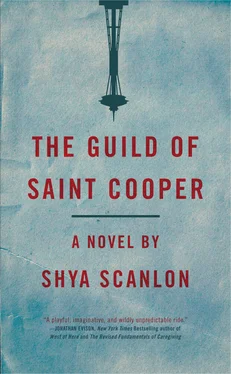“Alice, come back! What do you want me to do?”
She kept walking, and after a moment called back, “I don’t know, Blake. Why don’t you ask your mother?”
I watched her go until the sound of a car on 65th Street reminded me how exposed I was. I lifted my face up to the sun as Alice’s words echoed in my head, allowed myself to close my eyes for a count of five. One, if there was anyone on earth who might have a chance of convincing Blake to leave Cooper alone, at least until I had the opportunity to find him myself, it would be me. Two, I had to try. Three, though she could not have known where her advice would take me, Alice was right. Four, my mother could help me get through to Blake. Five, I opened my eyes and a wave of anxiety shot through my body, flushing me back up the front steps and into the house.
MY MOTHER WAS ALARMED by my story, which I explained in as much detail as I could. She’d always known Dale Cooper had been my source, known I’d thought him dead, knew my ambivalence about the initials in the trees, so she wasn’t surprised that my curiosity had been piqued by the letter. But my intention to pursue it concerned her.
It was not yet fully day, and the kitchen was filled with a blurry grayness broken only by cones of light from lamps above the counter. It was a quiet hour, and when my mother closed the silverware drawer it sounded like a slam. She stirred her coffee.
“Don’t misunderstand me — I applaud your interest in helping.”
“Well,” I said, “I wouldn’t call it helping, really.”
“Oh? What would you call it?”
“I don’t know, Mom. I just wouldn’t want Dale to be…I mean, a resistance movement that’s…”
I had not yet, I realized, articulated my interest, even to myself. Surely I wasn’t thinking of joining the movement, if there were one to join. Surely I didn’t think there was a chance of getting rid of the Lights. No number of fallen trees would be enough to starve them. Then what? Did I simply want to know for myself whether he was indeed behind it?
“I just wish you’d have more interest in helping on a practical level instead of chasing abstractions.”
“Dale Cooper isn’t an abstraction, Mom.”
“Is someone having disappeared years ago, whose only presence consists of his initials, concrete?”
Perhaps, I thought, I just wanted to see Blake.
I missed Blake, but did I want to see her?
No, I decided, I did not want to see her. I had to.
“Are you saying ideas are unimportant?”
My mother suddenly grew grave. “Blake, how would you feel if I asked Kent to come back to Seattle for a little while? I think it could be good for you.”
“Kent? Come on, Mom. I’m okay, seriously. I just want to have a few words with Blake.”
There was a long pause during which my mother’s expression went from worry to resignation. “Well, she’s a difficult woman to get to, as you can imagine.”
“But.”
“But I could probably get you close.”
We drove downtown, slowing at each checkpoint to press our IDs against the glass. Though most zombied people could drive if they’d been doing it for long enough, something as simple as showing an ID was beyond their reach — the theory being that the behavior was too new or unusual to exist in the deep memory areas Lights controlled — so the checkpoints served as an early warning sign for service activity. My mother explained they were in the process of breaking each existing area in half, doubling the checkpoints. It would give them more finely tuned coordinates for responding, but it would also be a pain in the ass.
It had been a while since I’d left Ballard, and I was surprised at how much had changed in most areas. Buildings had been demolished, their pieces either neatly stacked or missing, their foundations broken and removed from the earth. Large holes resulted, but there had been no effort made to fill them in, and these areas were grossly pitted as by some meteor shower. And yet, for all this, there had still been almost no activity downtown.
We passed a woman pulling branches off a sapling by the side of the road. Her dress was torn, and her movements looked mechanical, but we couldn’t see her face, so there was no way to tell whether she was Lit or just insane. My mother called it in anyway, giving the woman’s location. Someone would show up within fifteen minutes and try to deliver first aid if it was needed.
“How much do you see of that,” I said. “I mean, maybe she’s not Lit, but how often do you see some kind of service that only involves one person?”
“It’s not usually the case, but it’s frequent enough.”
“Doesn’t it seem weird?”
My mother glanced quickly at me, then back at the road. She’d always been a nervous driver, and no amount of time on the road could cure that. “As opposed to the things going on that don’t seem weird?”
“Oh, come on. You know what I mean.”
“Honestly, Blake, I don’t.”
We crossed down, closer to the water and away from my mother’s office. Elliott Bay spread out before us, high and still and smooth, and I thought of the ferries that once crossed it, carrying people to and from Bainbridge and other commutable distances now largely unlit by night. Public transportation had been one of the first government services to go as people started avoiding crowds. After the trees had been revealed, the Lights had little reason to hide — not that they’d been very good at it to begin with — and though they weren’t aggressive, once exposed they began entering people here and there, almost inquisitively, as though they too were ignorant of what could result. Then two dozen Lights encircled and entered a group of immigrants gathered outside the Federal Building on their way to renew their visas, and though they weren’t called up for service right away, it was enough to cause mass hysteria. People left, people looted, people locked themselves in their homes.
We passed an empty parking garage that had been partly disassembled. One side, still standing, bore stacks of concrete curbs and rebar. The sign out front said EARLY BIRD SPECIAL.
“Where are we going?”
“To a site. Remember last night? You heard the broadcast, I think.”
“The park?”
“Yes. They just want me to sign off. There are a few souls still active.”
It was strange to me that the City had adopted the term soul to describe a person carrying out his service, and stranger to hear it coming from my mother — an atheist for as long as I could remember. It was strange, but it fit.
A perimeter had been established a few blocks from the site, and a man wearing the City’s stark green protective suit saw my mother and waved us through. I had not seen a real service in progress, aside from tree maintenance crews, in many months, perhaps over a year, and even then I hadn’t seen the late stages, when most casualties were reported. We parked in a long narrow parking lot facing the water, zipped up our hoods, and my mother leaned over to check my seams.
The site was just beyond a large, once-manicured berm a hundred yards down the footpath into the park, and a coworker walked with us while providing details of the service and those involved.
“They dismantled six park benches,” he said, his voice muffled by his mask, “and took down a couple dozen young maples. But that’s not what—”
“How many souls?”
“Thirty-seven. Some have stopped, and they’re okay. Abrasions.”
We approached the berm, where three City men stood off to one side in conversation. One nodded at us, and the other two stopped talking, turned.
“But,” said my mother.
“But the big part of this, and we didn’t see it coming at first, is the hole.”
Читать дальше












